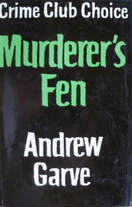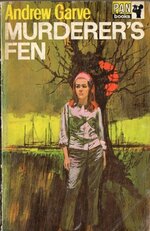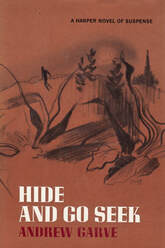
There’s nothing wrong with good, hyperbolic promotion, and often such matters are out of an author’s hands. But it does make one curious to see just what is so great and praiseworthy, and the best way to do that is to ignore the publicity blurbs and settle in to read the book. What I found with Murderer’s Fen was a collection of strengths and weaknesses that add up to an enjoyable but ultimately unbelievable and disposable little story.
Andrew Garve was a foreign correspondent based in Moscow during World War II, and some of his most lauded spy stories, including Murder in Moscow (1951) and The Ashes of Loda (1965), use his political experiences to present the brutal reality of Stalinist Russia. According to Curtis Evans’ overview at his site The Passing Tramp, genre critic Julian Symons labeled Garve as an “entertainer”, an author who had no greater objective than to keep a reader turning pages.
The pages of Murderer’s Fen turn easily, but I’m not sure if they add up to much. Evans also writes that he appreciates Garve “kept his books short”, and this one runs only 182 generously spaced pages. In theory, I agree: brevity is usually welcome in a mystery story, as all too often period authors can digress into cul-de-sacs of unneeded setting description and dialogue mannerisms. But at times the author’s narrative style here feels too brief, or more accurately too hurried. Large portions of the action are given almost in summary form. Rather than taking the required paragraphs to effectively present a scene or moment, the reader is given a removed précis of events: to prepare his plan, first the murderer does this, and then he goes there, and then he does that. It’s too breathless in places, and I sometimes felt I was reading a treatment instead of a novel.

The strengths: the plotline bubbles along, and it is clear the author takes great care to make sure that any dull moments are few and far between. According to a reader who commented over at crossexaminingcrime, Andrew Garve was an “ingenious plotsmith” who specialized in “unbreakable alibis and how they get broken.” This latter is what we have with Murderer’s Fen: Alan Hunt pursues a scheme to build an airtight alibi that will exonerate him even as the generated clues identify him as a prime suspect. Such a gambit may exist elsewhere in detective fiction, but I can’t recall a Christie or Crofts villain who played the game in just this way. Full marks for an imaginative new approach to alibi construction.
The problem is that the “brilliant scheme”, to use Inspector Nield’s admiring phrase, is also one that doesn’t hold up to too much close scrutiny. It relies on a lot of assumptions, the biggest of them being that the police will never return to search the fens for a missing girl if they have done so once, briefly, with no results. And if the girl’s body is found in the marshlands behind Hunt’s caravan, even years later, the once-prime suspect immediately becomes Suspect Number One again, as no other person in the case has a link to that location other than Hunt. Garve couldn’t even claim that his killer plans to elude police by disappearing and changing his identity, since he’ll be wed to the heiress.
My other difficulty is that, in addition to feeling like the reader is sometimes distanced from the action, the dialogue and characterization is rather one-dimensional and never surprising. They are the pieces to be duly moved around and brought into expected conflict with one another. I could never quite forget that they exist as components of a suspense story, not as actual people. There are no real shades of grey here, and I know it might be unreasonable to expect such nuance.
 U.S. title: Hide and Go Seek
U.S. title: Hide and Go Seek Andrew Garve’s espionage stories may have a bit more depth and reward to them, and if I do “Go for Garve” once more, I will surely try one of his international spy titles. I can also report that several detective fiction readers on social media say they enjoy this author, although many in the same breath add that they don’t remember his books after reading and don’t really seek them out. And that seems to be my assessment too, regardless of what Eudora Welty might say.
 RSS Feed
RSS Feed